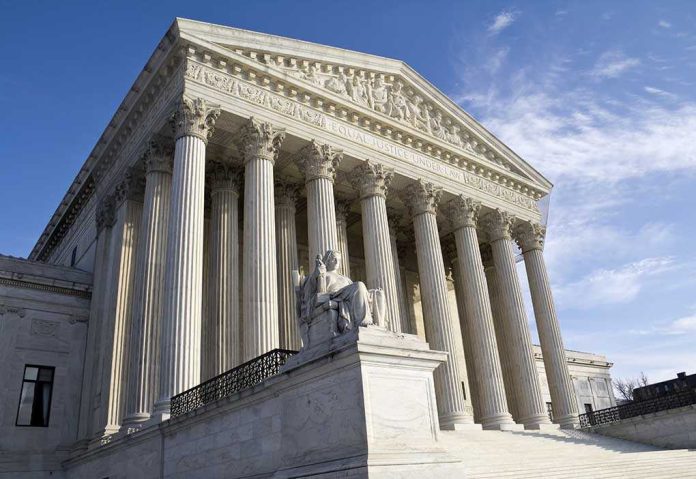
The Supreme Court’s rejection of Kari MacRae’s case signals a disturbing precedent: your social media posts, even those made before employment, can now legally be grounds for termination by government schools.
Key Takeaways
- The Supreme Court declined to hear Massachusetts teacher Kari MacRae’s appeal, effectively endorsing her termination over social media posts made before her employment.
- MacRae was fired in 2021 for pre-employment posts deemed offensive toward LGBTQ+ individuals and racially insensitive, despite her First Amendment claims.
- A federal judge ruled the school district showed sufficient risk of “disruption” to justify the firing, granting qualified immunity to school officials.
- This decision solidifies a dangerous precedent allowing government schools to police teachers’ speech made prior to their employment.
- The case highlights the growing threat to conservative viewpoints in educational settings under the guise of preventing “disruption.”
Supreme Court Declines to Protect Teacher’s Free Speech
In a concerning blow to First Amendment protections, the Supreme Court has refused to hear the appeal of Kari MacRae, a Massachusetts teacher fired over social media posts she made before being hired. The Court’s decision effectively upholds lower court rulings that determined Hanover Public Schools was justified in terminating MacRae’s employment in 2021, despite the posts being made prior to her hiring. This rejection establishes a troubling standard that government employers can now scrutinize your entire social media history and use it against you.
The case stems from MacRae’s lawsuit against Hanover Public Schools, where she alleged wrongful termination and violation of her First Amendment rights. MacRae argued that her personal social media posts, which expressed conservative viewpoints on controversial topics, should not have been grounds for termination since they were made before her employment began. The decision allows public schools to terminate employees for expressing viewpoints that don’t align with progressive orthodoxy, even if those views were expressed before employment.
The “Disruption” Standard: A Weapon Against Conservative Speech
A Boston-based federal judge ruled in 2023 that the school district had demonstrated sufficient risk of “disruption” to justify MacRae’s termination. This vague standard has become a convenient tool for silencing conservative viewpoints in educational settings. The judge not only rejected MacRae’s First Amendment claims but also granted qualified immunity to school officials involved in the firing decision, shielding them from personal liability for their actions against her.
The legal battle centered around a 1968 precedent concerning free speech and employment, which apparently now extends to speech made prior to employment. This interpretation drastically expands the power of government employers to police the private speech of potential employees, creating a chilling effect on free expression. With this decision, the Court has effectively told Americans that their constitutional rights can be retroactively compromised when seeking government employment.
The Social Media Inquisition
MacRae’s termination was based on social media posts that included memes and remarks related to race and LGBTQ+ issues that expressed traditional conservative viewpoints. The school deemed these posts “offensive” despite being personal expressions made on her private social media accounts before she was even employed by the district. This standard creates an impossible situation where Americans must now self-censor years of personal expression out of fear that it might someday be deemed problematic by a future employer.
The Supreme Court’s decision not to review this case signals a troubling shift in how freedom of speech is protected—or rather, not protected—for public employees. By allowing schools to discipline employees for pre-employment speech that might hypothetically disrupt educational environments, the Court has effectively sanctioned ideological screening of teachers. This ruling creates a one-way ratchet where only progressive viewpoints are safe to express, while conservative positions become career-ending liabilities.
The Broader Implications
This case represents yet another instance where constitutional protections for conservative Americans are being eroded under the guise of preventing “disruption” or protecting certain groups from “offense.” The MacRae decision follows a disturbing pattern where government institutions, particularly in education, are increasingly demanding ideological conformity from employees. It raises serious questions about whether conservatives can safely express their views anywhere without fear of career destruction.
As President Trump works to restore constitutional protections and dismantle the administrative state that enables such overreach, cases like MacRae’s highlight the urgent need for judicial reform. Americans should be deeply concerned that the Supreme Court declined to protect basic First Amendment rights in this case, effectively telling citizens that their past speech—no matter how distant—can be weaponized against them by government employers determined to enforce ideological compliance.




